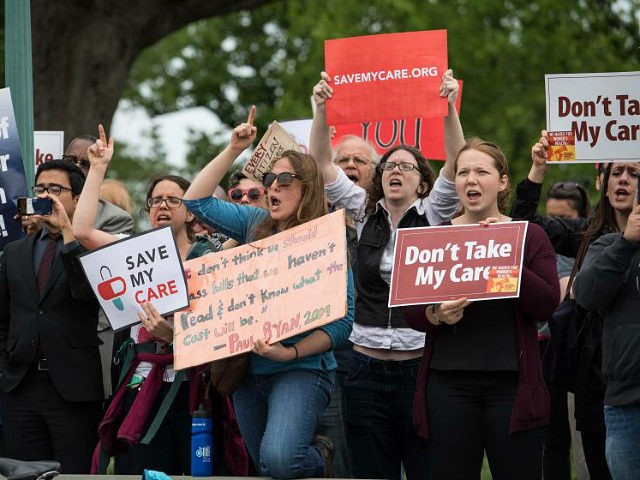The Trump administration agreed to continue paying Obamacare “cost-sharing-reduction” payments that subsidize insurance companies for covering individuals who earn between 100 to 250 percent of the poverty rate, despite suggesting it would not do so, and despite the possibility that the payments will be declared unconstitutional.
Obamacare was supposedly designed so insurance plans would pay of 70 percent of the expected healthcare expenses, and enrollees would pay 30 percent of the expected costs for services, through cost sharing measures such as deductibles, copayments, and coinsurance.
But to expand the number of individuals signing up for coverage, the Obama administration chose to make cost-sharing-reduction (CSR) payments directly to insurance companies that enrolled individuals making between 100 and 250 percent of the poverty rate in each state. That made signing up for Obamacare wildly more attractive for individuals earning about $12,060 to $30,150.
But with the House of Representatives in Republican hands, a party-line majority voted in 2014 to file a lawsuit challenging President Obama’s 2013 decisions to delay the implementation of the employer mandate for a year and direct the U.S. Treasury to fund Obamacare’s cost-sharing reduction payments without annual Congressional approval.
Judge Rosemary Collyer of the U.S. Court for the District of Columbia ruled on May 12, 2016 that the Obama administration could not constitutionally reimburse insurers for the costs they incured to reduce cost sharing without a Congressional authorization. But with the Obama administration appealing the decision, Judge Collyer stayed her order.
It has been expected since January that the Trump administration would drop the appeal to end the CSR payments. But with insurance companies expected to take huge losses and then to retaliate by spike healthcare premiums the following year, the Trump administration has continued the appeal process while making the CSR payments each month.
The Trump administration had claimed that continuing the illegal CSR payments during the court stay was part of its strategy to negotiate a promised Republican repeal and replace of Obamacare. But since Senator John McCain (R-AZ) cast the decisive “no vote” on July 27 to kill the “skinny repeal,” there seemed no reason the Trump administration would continue making CSR payments.
The day before the Administration was expected to cut CSR payments, the non-partisan Congressional Budget Office released a report titled “The Effects of Terminating Payments for Cost-Sharing Reductions.” The CBO estimated that ending CSR payments would increase the average 2018 Obamacare healthcare premium for an individual by 20 percent, plus drive the federal deficit up by $194 billion between 2017 and 2026 as insurance companies billed higher Obamacare costs.
Breitbart News reported earlier this month that despite an annual inflation rate of only 1.6 percent, Covered California had granted healthcare insurers average premium increases of 12.5 percent. But after losing some insurers already, Covered California was also reported to be considering guaranteeing health insurers against loss for any year by allowing insurers to jack up profits for three years with much higher premium increases, following any loss.

COMMENTS
Please let us know if you're having issues with commenting.